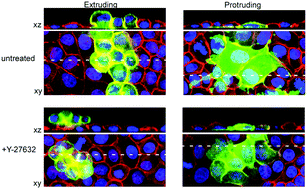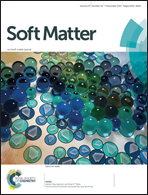Mechanical mismatch between Ras transformed and untransformed epithelial cells
Abstract
The organization of the actin cytoskeleton plays a key role in regulating cell mechanics. It is fundamentally altered during transformation, affecting how cells interact with their environment. We investigated mechanical properties of cells expressing constitutively active, oncogenic Ras (RasV12) in adherent and suspended states. To do this, we utilized atomic force microscopy and a microfluidic optical stretcher. We found that adherent cells stiffen and suspended cells soften with the expression of constitutively active Ras. The effect on adherent cells was reversed when contractility was inhibited with the ROCK inhibitor Y-27632, resulting in softer RasV12 cells. Our findings suggest that increased ROCK activity as a result of Ras has opposite effects on suspended and adhered cells. Our results also establish the importance of the activation of ROCK by Ras and its effect on cell mechanics.



 Please wait while we load your content...
Please wait while we load your content...